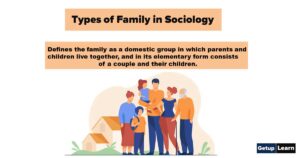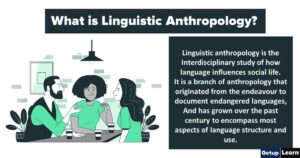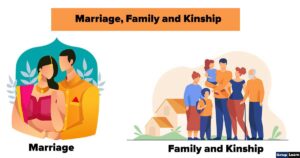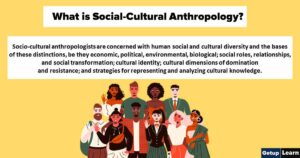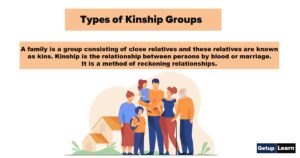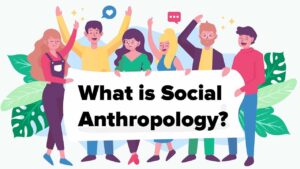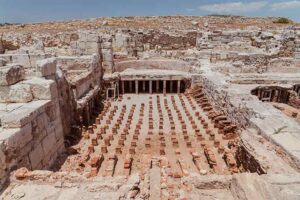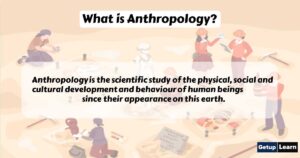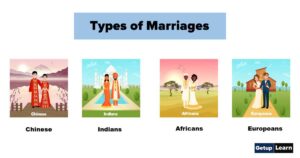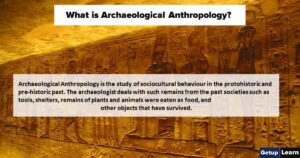Table of Contents
What is Folkloristic Anthropology?
Study of folklore is known as Folkloristics. Anthropologists consider Folklore as a part of culture. Study of culture will be incomplete without the knowledge of folk traditions. The knowledge, beliefs and values of a society play an important role in determining other aspects like marriage, family and economic organisation. Folklore is the pulse of the culture.
Anthropologists try to understand these pulses by going deep into the culture. Hence it is the duty of an anthropologist to describe the folklore of a given society while documenting, preserving, and popularising the culture.
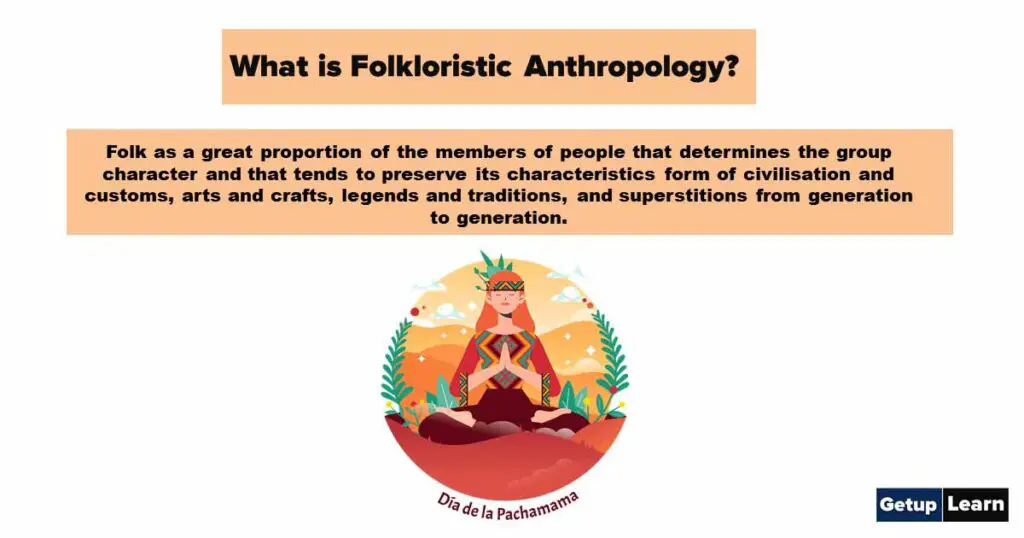
Table of Contents
Folklorist is a person who studies folklore. Folklore as a discipline began in the 19th century. It has been studied from different viewpoints. Earlier folklore was studied as part of ethnographic research. Thus folklore became an indispensable part of anthropological research and ethnographic accounts.
Anthropologists consider folklore as product or part of culture. They view folklore as ‘people’s autobiographical description’.
Meaning of Folklore
The word folklore originated from two words ‘folk’ and ‘lore’, which were used independently. The word folk is used to denote ‘indigenous, traditional or related to agriculture’, and the word ‘lore’ means knowledge. The word ‘folklore’ was first used by William J Thoms in 1846. Earlier it was known as ‘popular antiquities’ and ‘popular literature’. But later it was replaced by ‘folklore’.
According to W.J.Thoms, the manners, observances, superstitions, ballads, proverbs and so on of the olden times were included in folklore for fear of being extinct. The concept of folk and folklore has undergone various changes and modifications over these years.
Folklore consists of beliefs, customs, drama and dance, art, craft, painting and sculpture belong to the past which are handed over from generation to generation. With the development of modern society they are at the edge of extinction. Folklore of every society consists of folk literature, folk beliefs and practices, folk games, folk art, and folk science & technology.
Definition of Folklore
Old Definition of Folklore
Attempts have been made by anthropologists and folklorists to define folklore. First of all let us examine the earlier definition of folklore:
[su_quote cite=”Webster’s Dictionary”]Folk as a great proportion of the members of people that determines the group character and that tends to preserve its characteristics form of civilisation and customs, arts and crafts, legends and traditions, and superstitions from generation to generation.[/su_quote]
[su_quote cite=”William Johns”]Folklore includes the manners, customs, observances, superstitions, ballads, proverbs and so on of the olden times which were transmitted orally from generation to generation.[/su_quote]
Modern Definitions of Folklore
[su_quote cite=”Alan Dundes”]Anthropologists defined folklore on the basis of folk and lore. To him folk is any group of people who share at least more than one common characteristic. The common factor may be a common occupation, language or religion. All their common characteristics are considered as folklore. Hence a nation or a family also becomes a folk and its knowledge becomes the folklore.[/su_quote]
[su_quote cite=”Franz Boas, American Anthropologist”]Folklore is the reflection of culture, both past and present.[/su_quote]
[su_quote cite=”William Wells Newell”]Folklore is the ‘unwritten popular traditions of civilized countries.[/su_quote]
Folk Literature
Folk literature consists of folk songs, folktales, myths, legends, proverbs, riddles, ballads, blessings, curses, simile and metaphors, nicknames, history of place names (Stalapuranas), oaths, greetings and fables. Some of them are passed to the next generation orally and some others are preserved in script:
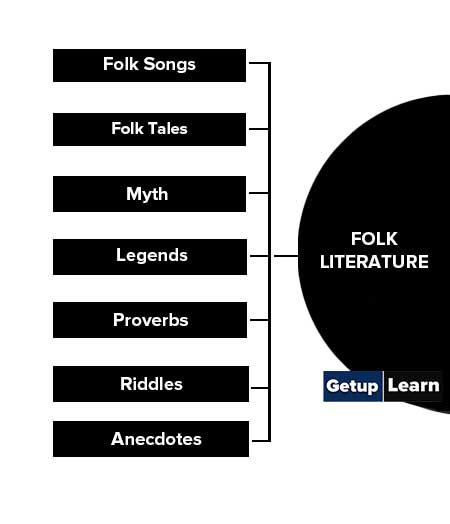
Folk Songs
It forms an important part of folk literature. Folk songs draw their themes from religion and mythology, agricultural operations like sowing and harvesting, incidents in social life like weddings, beauties of the landscape, and even heroic activities, etc. These songs reflect the joys, sorrows, hopes, and aspirations of the common people.
In Kerala, the songs related to the origin of theyyam, thira, kalamezhuthu, moral songs, vanchippattu, villadichanpattu, vadakkan pattu, thekkan pattu, mailanchi pattu, vattakkali pattu, oppana pattu and margamkali pattu come under this category.
The famous folk song which deals with the golden age of the legendary king Mahabali is famous in Kerala. This folk song is sung on the occasion of Onam.
Folk Tales
Folktales are the stories depicting courage, bravery, moral values, good manners and reverence to supernatural are transmitted through generations. It consists of fairy tales, animal tales, magical stories, humorous tales and moral stories. Folktale functions as an informal way of enculturating generations especially among the rural folk.
The folktales popular in Kerala include ‘parayipetta panthirukulam’, tales of Kayamkulam Kochchunni, Viruthan Sanku, stories related to the origin of theyyam, thira, and stalapuranas. ‘Aitheehyamala’ by Kottarathil Sankunny is a treasure house of folk tales in Kerala.
Myth
Standard dictionary of folklore defines myth as a ‘story’ presented as actually happened earlier, explaining the nature and supernatural, tradition of people, their gods, heroes and religious beliefs. They usually provide a justification for religious beliefs and practices. These are conveyed in the form of stories from elders to new generation.
Myths represent fundamental beliefs and values of the culture. In pre-literate or simple societies myths are real part of their social-cultural environment. They reflect the interest of the group and lead the new generation to imitate the examples represented in it. Several myths exist in India regarding the origin of different castes.
Legends
Legends are stories narrated in such a way as if it actually happened. Commonly legends consist of pseudo historical narrations about the heroism of leaders and establishment of customs. They are the mixture of realism and supernaturalism. They may or may not be truth but are used to entertain, inspire, or convey values to next generation.
Legends cannot be attributed to any author. They are usually explained as if they were from real life. Heroism of their ancestors or gods is conveyed through this. Long legends in rhythmic prose or poetry are known as epics.
Proverbs
Proverbs are traditionally existing morals or advices ‘in brief statements’. They originated from the live experience of early people. They are transmitted from generation to generation orally. Proverbs will be meaningful only when they are used in suitable situations.
Proverbs critically analyse the society and reveal the truth behind it and applicable in a particular context. For example ‘mindapoocha kalamudakkum’ (silent cat will break the pot), ‘kakka kulichal kokkakumo’ (crow will never became a crane even after continuous bath), rolling stone gathers no moss, pride goes before a fall…etc.
Riddles
Riddle is a statement, question or phrase having double meaning. Riddle is an important entertainment activity that caters intellectual development among children. ‘adi paara, nadu vadi, meethe kuda’ (Chena) is an example for riddle.
Anecdotes
Anecdote is a short and amusing or interesting account of a real incident. In anecdotes, the place and person involved is identifiable. Story of Kayamkulam Kochunni is one of its kinds.
Ballads
Ballads are narrative set to music songs in simple stanzas related to heroes of past emphasising their qualities. Vadakkan pattukal (Northern ballads), Thekkan paattukal (southern ballad), puthuram pattukal, thacholipatukal, iravikkuttipillaipattu and valiyathampi-kochuthanpi patukal are famous ballads in Kerala.
FAQs About Folkloristic Anthropology
What are the 8 types of folk literature?
These are the 8 types of folk literature:
1. Folk Songs
2. Folk Tales
3. Myth
4. Legends
5. Proverbs
6. Riddles
7. Anecdotes
8. Ballads.
YOU MIGHT ALSO LIKE
- What is Anthropology?
- Branches of Anthropology
- What is Social Anthropology?
- Scope of Social Anthropology
- Nature of Social Anthropology
- What is Social Cultural Anthropology?
- Theories of Sociocultural Anthropology
- What are Archaeological Sites?
- Types of Archaeological Sites
- What is Linguistic Anthropology?
- What is Marriage?
- Types of Marriage
- What is Family?
- Types of Family in Sociology
- Functions of the Family
- Folk literature
- What is Biological Anthropology?
- Biological Anthropology Fields of Study
- What is Social Anthropology?
- Definition of Social Anthropology
- Scope of Social Anthropology
- Nature of Social Anthropology
- What is archaeology?
- What is Archaeological Anthropology?
- Process of Archaeology
- Types of Archaeology Sites
- Linguistics Language
- Linguistic Culture
- Types of Marriages
- What is Kinship?
- Types of Kinship Groups
- What is Folkloristic Anthropology?

